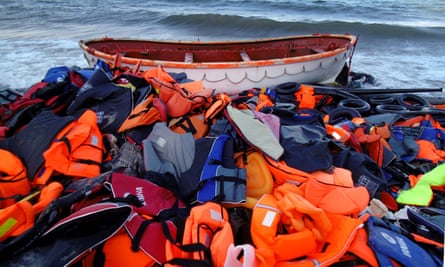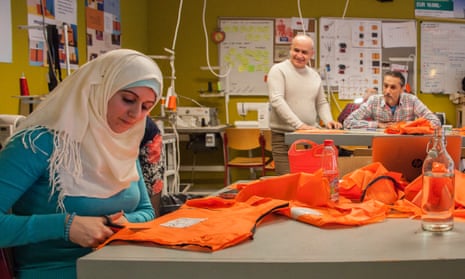“When I’m working, I think about the people who wore these lifevests,” says Ramzi Aloker. “Who were they and what happened to them? I also remember my own journey. The dark sea and the steep Greek mountains.”
Back in Damascus, Aloker, 46, designed girls’ clothing. Now, he sews together laptop sleeves and tote bags in a workshop on the outskirts of Amsterdam. The bright orange and black bags are made from lifejackets worn by refugees as they crossed the Mediterranean sea.
More than 850,000 people arrived in Greece by sea in 2015 alone, with more than 500,000 of these arriving on the island of Lesbos. As well as dealing with large numbers of refugee arrivals, islanders were also faced with an unusual problem: hundreds of thousands of life vests that were left on Greek shores.
Quick GuideWhat is the Upside?
Show
Ever wondered why you feel so gloomy about the world - even at a time when humanity has never been this healthy and prosperous? Could it be because news is almost always grim, focusing on confrontation, disaster, antagonism and blame?
This series is an antidote, an attempt to show that there is plenty of hope, as our journalists scour the planet looking for pioneers, trailblazers, best practice, unsung heroes, ideas that work, ideas that might and innovations whose time might have come.
Readers can recommend other projects, people and progress that we should report on by contacting us at theupside@theguardian.com
When the people behind the Dutch social enterprise Makers Unite heard about the problem, they decided to bring 5,000 lifejackets to Amsterdam. Over the past year, as part of a six-week coaching programme to help refugees establish careers in the Netherlands, 71 refugees have been involved in making and selling the bags, including 13 who have joined a team of tailors to create the upcycled products.
“We give both the newcomers and this waste material a second chance,” says Thami Schweichler, the director and co-founder of Makers Unite. He also believes the material will spark a much-needed discussion. “We hope our products will create awareness about refugees and at the same time help them build a future.”
The tailors receive €150 (£131) a month for their eight hours of weekly volunteer work, in addition to unemployment benefits. Among the tailors are Eman Haj Omar and her husband, Ammar, who made the sea voyage together in 2015. Back in Aleppo, Ammar used to work with an electronic embroidery machine in her father’s company. When a bomb was dropped on their children’s school, it was time to leave. They paid a smuggler €3,000 (£2,623) for the crossing from Bodrum to the island Kos in a small rubber boat; the journey took four hours.

“We were terrified it would sink,” she says. “It was dark. Our children were crying.”
In the beginning, working with the life vests was a painful reminder of their trip.
“It made me think of the children who have drowned,” says Ammar. “That boy on the beach we saw on TV in Greece, the one with the red T-shirt.”
His wife tells him the boy’s name is Alan Kurdi – the three-year-old Syrian boy whose body was washed up on a Turkish beach, pictures of whom caused outrage around the world. The couple are used to working with the orange fabric now, and say the workshop is a great place to get to know locals and to practise Dutch.

So far, Makers Unite has found paid jobs for about 10% of the participants in their programme. Others have found internships and education or have started their own businesses.
Ramzi Aloker, who dreams of starting a girls’ clothing brand, will soon be starting a two-month training programme prior to taking a job as a tailor at the Dutch clothing brand Suitsupply.
Makers Unite sells about 100-200 products every month, mostly through its website. Orders come primarily from the Netherlands, the UK and the US. The products will also be available in the Victoria and Albert Museum in London from 7 May.
“Customers like that we’ve created something positive out of such a difficult situation,” says Schweichler. “I think many buy our products as a statement against their governments’ anti-immigration policies.”
Quick GuideFurther reading - how to help refugees
Show
Volunteer
The Red Cross has suggestions of organisations to help you get involved. Dave Smith of Boaz Trust has offered to direct those who are unable to find local groups.
Skills in teaching, languages and medicine are highly valued in volunteers. Doctors of the World UK holds clinics run by volunteers with and without medical experience. The clinics in London and Brighton provide medical care, information and practical support. Find out how you can get involved here.
Host
Charities work with volunteers to provide accommodation
for those unable to rely on the authorities. Some hosting is only
temporary, for up to a few months while the person is granted asylum and
given a national insurance number. Long-term housing support is needed
for those struggling to prove their case for asylum.
Assist in Sheffield, the Boaz Trust in Manchester and Housing Justice in London rely on volunteers and are always looking for people willing to give up space in their home.
Abigail Housing in Leeds and Open Doors in Hull provide accommodation in empty vicarages and church buildings as well as houses lent by owners.
Lobby
Citizens UK encouraged many local communities across the country to lobby their councils following the government’s promise to resettle 20,000 Syrian refugees by 2020.
Safe Passage UK fights for refugee rights through campaigning and calling on councils to sign up to resettlement. The charity has been successful in persuading councils to sign up despite the government’s claim that the number could not be increased because there was nowhere to resettle refugees.
Schemes
Refugees want security, hope – and purpose. The Guardian has covered a range of schemes helping with this. Find out more about these at our New Arrivals hub.
“These bags can tell people about the tragedy taking place between Damascus and Europe,” says Aloker. “It might get people thinking about the dangers we faced and why we are here.”
This article is part of a series on possible solutions to some of the world’s most stubborn problems. What else should we cover? Email us at theupside@theguardian.com
